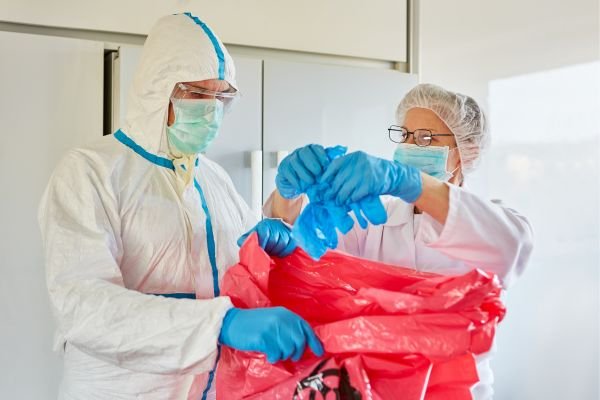Biohazard cleaning, often referred to as biohazard remediation, involves the meticulous process of removing, cleaning, and disinfecting areas where potentially infectious materials or harmful substances have been present.
This can include scenes of accidents, violent crimes, suicides, and the presence of substances like blood, bodily fluids, and other pathogenic substances. Given the dangerous nature of these materials, biohazard cleaning is not just a matter of public health but also safety and compliance. This guide delves into what biohazard cleaning involves, the challenges faced by professionals, and the strict protocols that must be adhered to in order to ensure safety and efficacy.
What constitutes a biohazard?
A biohazard is any biological substance that poses a threat to human health. This includes medical waste, microbiological wastes, pathological wastes, blood, blood products, and bodily fluids. In the context of biohazard cleaning, these are typically materials contaminated as a result of accidents, deaths, or diseases that are infectious or hazardous.
The role of biohazard cleaning professionals
Professionals who specialize in biohazard cleaning are trained to handle and dispose of biohazardous waste safely. Their work often requires wearing protective gear such as gloves, gowns, masks, and eye protection to prevent exposure to infectious materials. They must also be well-versed in the regulatory requirements and guidelines set forth by organizations like OSHA (Occupational Safety and Health Administration) and the EPA (Environmental Protection Agency).
Training and certification
Biohazard cleaning technicians are required to undergo rigorous training and certification. They learn about the various types of biohazards and the appropriate methods for handling and disposing of these materials. Training also includes the use of specialized cleaning agents and equipment necessary to safely clean and disinfect affected areas.
Procedures and protocols in biohazard cleaning
Biohazard remediation is a detailed process that involves several critical steps:
Assessment
The first step in any biohazard cleaning process is to assess the extent of contamination. This helps in planning the scope of cleaning and the level of protective measures needed.
Containment
To prevent the spread of contaminants, the affected area must be isolated and contained. This involves sealing off the area and using air filters to control airborne pathogens.
Removal and disposal
All biohazard materials must be carefully removed and disposed of according to federal and state regulations. This typically involves placing contaminated materials in biohazard bags and disposing of them at licensed facilities.
Cleaning and disinfection
After removal, the area must be thoroughly cleaned using hospital-grade disinfectants. This step is vital to eliminate any remaining pathogens and ensure the area is safe for occupancy.
Verification
Post-cleaning testing is conducted to verify that the area meets safety standards. This might involve visual inspections and the use of testing kits to detect the presence of biohazards.
Challenges in biohazard cleaning
Biohazard cleaning poses several challenges, including:
- High risk of infection: Technicians are at risk of exposure to infectious materials, which requires constant vigilance and adherence to safety protocols.
- Emotional and psychological impact: Cleaning sites of trauma, especially those involving violent deaths, can be emotionally taxing.
- Regulatory compliance: Navigating the myriad of regulations that govern biohazardous waste disposal can be complex.
Importance of professional biohazard cleaning services
The need for professional biohazard cleaning services cannot be overstated. Incorrect handling of biohazardous materials can lead to serious health risks, including the spread of infectious diseases. Professional cleaners ensure that biohazard scenes are restored to safe, non-hazardous states, thereby protecting public health and safety.
Infinity Cleanse is a specialized company dedicated to providing comprehensive biohazard cleaning services. With a team of highly trained and certified professionals, Infinity Cleanse ensures that all areas affected by biohazards are restored to safe, sanitary conditions. They employ rigorous protocols and advanced equipment to manage and remediate any site contaminated with biohazardous materials, emphasizing safety, efficiency, and compliance with all relevant health and environmental regulations. Whether dealing with a crime scene, an accident, or any other scenario where biohazards are present, Infinity Cleanse offers reliable and thorough cleaning solutions.
Biohazard cleaning is a critical service in the aftermath of incidents that pose health and safety risks. The rigorous standards and protocols followed by biohazard cleaning professionals are designed to manage these risks effectively, ensuring that affected environments are thoroughly sanitized and safe for re-entry. This work, though challenging, is essential for the safety and well-being of both the public and the environment.

